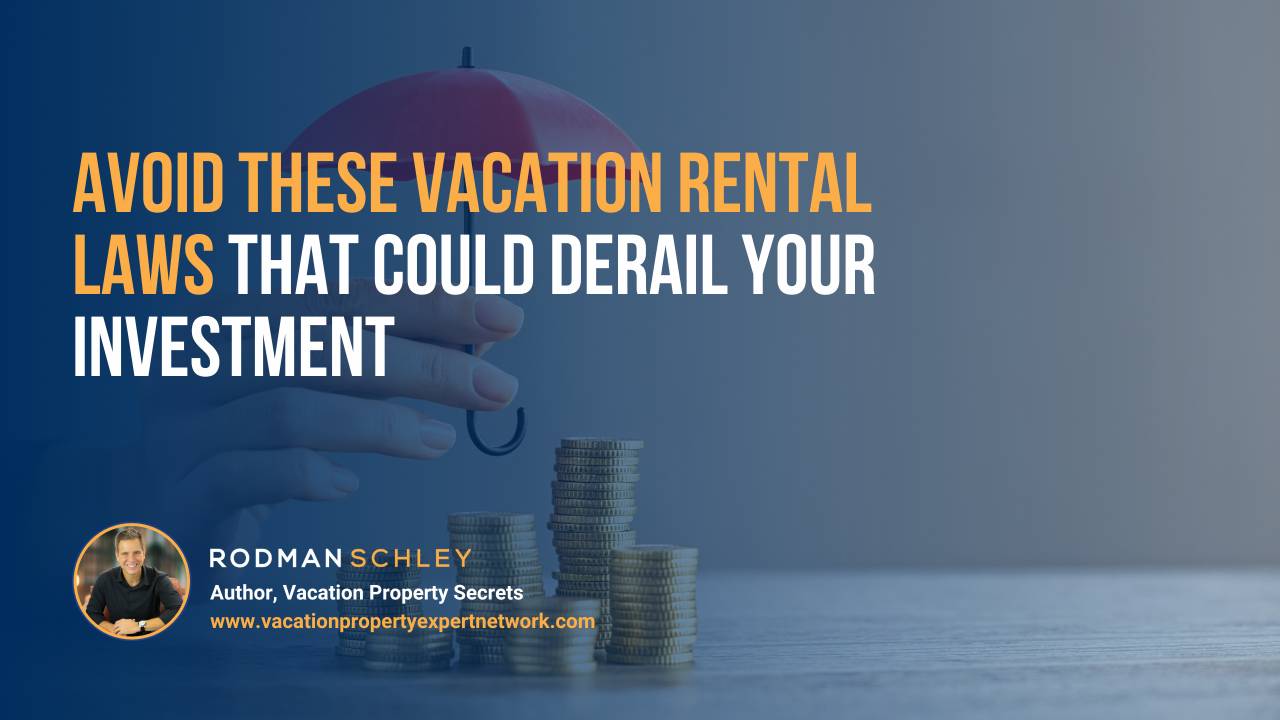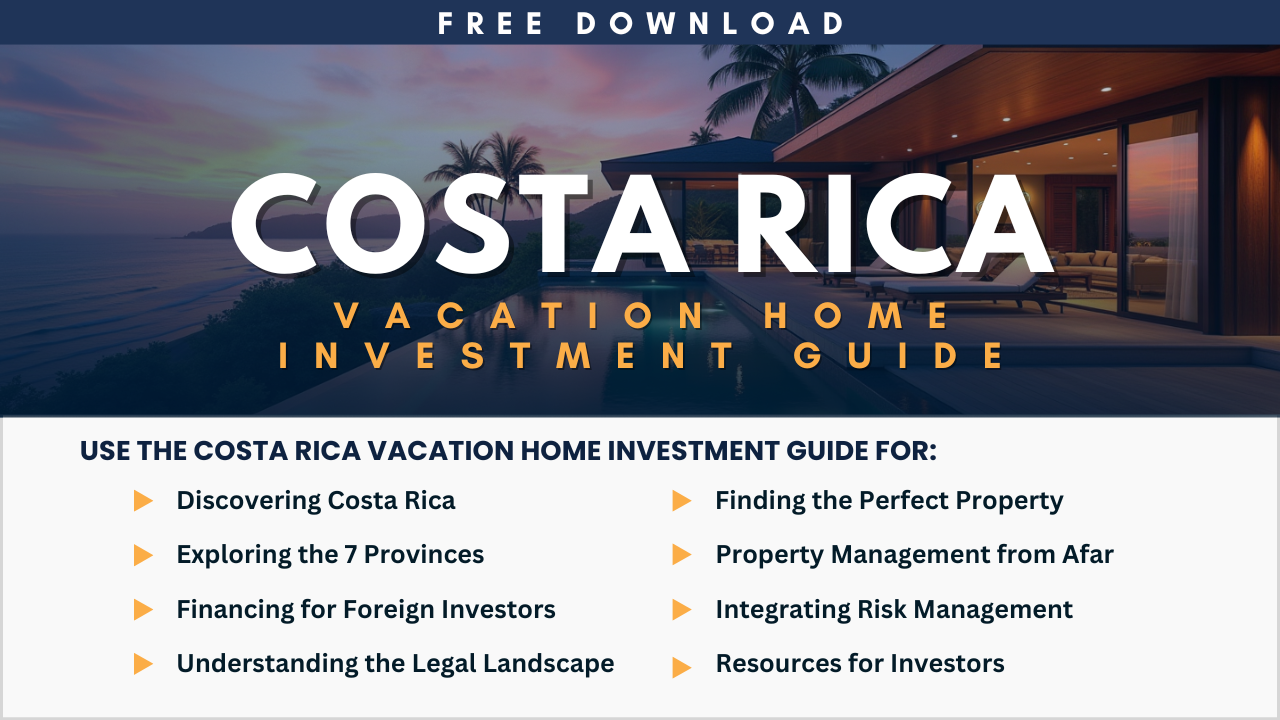
Avoid These Vacation Rental Laws That Could Derail Your Investment
Vacation rentals can be a lucrative investment, offering steady income streams and the flexibility to rent out properties on your terms. However, many vacation rental owners make the mistake of assuming that once they have a property, it’s smooth sailing. The reality is, navigating vacation rental laws can be tricky. If you’re not careful, certain laws and regulations could derail your investment, leading to fines, legal issues, or even the loss of your property.
Laws governing vacation rentals can vary greatly depending on your location—what applies in one city or state might be completely different in another. And as more cities crack down on short-term rentals, it's essential to stay informed about the rules in your area. Failing to comply with these regulations can result in costly mistakes, unnecessary headaches, and wasted time and money.
In this post, we’ll explore some of the most common vacation rental laws that could impact your investment and offer tips on how to avoid them. By understanding these regulations, you’ll be in a better position to protect your property, maximize your profits, and ensure your vacation rental business stays on track.
Why It’s Important to Understand Vacation Rental Laws
Vacation rental laws exist for a reason—they aim to protect neighborhoods, regulate the tourism industry, and ensure that rental properties meet safety and health standards. However, these laws can sometimes be complicated, especially if you’re not familiar with local ordinances or haven’t kept up with changes in legislation.
Understanding vacation rental laws is crucial for several reasons. First, it helps you avoid fines and penalties, as many cities impose heavy fines for non-compliance, and in some places, operating without a license can lead to daily fines or even the closure of your rental. Second, it protects both your property and guests. Safety regulations, health codes, and zoning laws ensure vacation rentals meet necessary standards, and failure to follow these laws can lead to liability issues.
Additionally, staying compliant helps maintain a positive reputation. Guests value transparency and accountability, and many choose rentals based on the host’s adherence to local rules. Finally, understanding vacation rental laws ensures the long-term viability of your business, making sure it remains sustainable and legally operational. By staying informed about these regulations, you can avoid disruptions that could affect your rental’s income-generating potential.
Short-Term Rental Licensing and Registration Requirements
One of the most common legal hurdles vacation rental owners face is licensing and registration requirements. Many cities require hosts to register their vacation rental and obtain a specific license before listing the property. Failing to do so can result in hefty fines and, in some cases, having your listing removed from popular rental platforms like Airbnb or Vrbo.
What you need to know:
-
Research Local Regulations:
- Licensing requirements can vary greatly by location. Some cities require all short-term rentals to be licensed, while others may have restrictions based on property size or type. Check with your local government or municipal website to learn about the specific requirements in your area.
- Licensing requirements can vary greatly by location. Some cities require all short-term rentals to be licensed, while others may have restrictions based on property size or type. Check with your local government or municipal website to learn about the specific requirements in your area.
-
Application Process:
- The process for obtaining a license typically includes submitting an application, providing proof of insurance, paying a fee, and agreeing to inspections. Some cities also require vacation rentals to be inspected for safety and health standards before approval.
- The process for obtaining a license typically includes submitting an application, providing proof of insurance, paying a fee, and agreeing to inspections. Some cities also require vacation rentals to be inspected for safety and health standards before approval.
-
Renewal and Compliance:
- In many places, vacation rental licenses need to be renewed periodically. Additionally, you’ll need to ensure ongoing compliance with city regulations, such as reporting guest numbers and the length of stays.
- In many places, vacation rental licenses need to be renewed periodically. Additionally, you’ll need to ensure ongoing compliance with city regulations, such as reporting guest numbers and the length of stays.
If your city requires a license, make sure you follow the process to avoid costly fines and to keep your rental listing active on booking platforms.
Zoning and Land Use Restrictions
Zoning laws are another critical legal consideration for vacation rental owners. Zoning laws are designed to control how land is used in specific areas, and they can have a significant impact on whether or not you can legally operate a vacation rental.
Here’s what to keep in mind:
-
Residential vs. Commercial Zoning:
- Many areas only allow short-term rentals in properties zoned for commercial or mixed-use purposes. If your property is located in a strictly residential zone, you may be prohibited from renting it out as a vacation rental.
- Many areas only allow short-term rentals in properties zoned for commercial or mixed-use purposes. If your property is located in a strictly residential zone, you may be prohibited from renting it out as a vacation rental.
-
Neighborhood-Specific Rules:
- Even if the property is located in an area that allows vacation rentals, there may be additional restrictions based on the neighborhood. Some residential communities have rules that limit the number of vacation rentals allowed in a given area, or they may impose restrictions on the length of stays.
- Even if the property is located in an area that allows vacation rentals, there may be additional restrictions based on the neighborhood. Some residential communities have rules that limit the number of vacation rentals allowed in a given area, or they may impose restrictions on the length of stays.
-
Grandfathering and Transition Rules:
- Some cities have “grandfathered” in older vacation rentals, allowing them to operate without meeting newer zoning restrictions. However, if you’re considering purchasing a property for use as a vacation rental, be sure to check whether it’s subject to the same zoning regulations or if there are any transitional rules that apply.
- Some cities have “grandfathered” in older vacation rentals, allowing them to operate without meeting newer zoning restrictions. However, if you’re considering purchasing a property for use as a vacation rental, be sure to check whether it’s subject to the same zoning regulations or if there are any transitional rules that apply.
Understanding the zoning laws in your area is critical for ensuring that your vacation rental is operating legally and without restriction.
Taxes and Fee Structures for Vacation Rentals
Taxes are another area where vacation rental owners often run into trouble. Many cities and states now impose additional taxes on short-term rental income, and these taxes can be complex, depending on your location.
What you need to know:
- Occupancy Taxes: In many places, vacation rental owners are required to charge and remit occupancy taxes (also known as “bed taxes” or “transient occupancy taxes”). These taxes are typically a percentage of the rental rate and are often collected from the guest at the time of booking.
- Income Taxes: Short-term rental income is considered taxable in most jurisdictions, so you’ll need to report your earnings and pay the appropriate income taxes. Depending on where you live, you may need to pay both federal and state income taxes on your rental income.
- Sales Tax: Some regions also require vacation rental owners to collect sales tax on rental income, in addition to occupancy taxes. This can be particularly complex if you rent out multiple properties in different areas with varying tax rates.
- Online Platforms and Tax Reporting: Many booking platforms, such as Airbnb, now collect and remit occupancy taxes on behalf of hosts in certain jurisdictions. However, it’s still important to be aware of your tax obligations and consult with a tax professional to ensure compliance.
Failure to collect or remit the required taxes can result in penalties, so make sure you stay on top of tax regulations for vacation rentals in your area.
Safety and Health Regulations
Safety regulations are designed to protect both you and your guests. Vacation rental properties are often required to meet specific health and safety standards, and failure to comply can result in fines, insurance complications, or even legal action in the case of an accident or injury.
Key regulations to watch for:
- Smoke and Carbon Monoxide Detectors: Many cities require that vacation rentals have working smoke detectors and carbon monoxide detectors installed. These should be checked regularly to ensure they are functioning properly.
- Fire Safety Equipment: Fire extinguishers, first aid kits, and clear emergency exits are often required for vacation rentals. These items should be accessible and in good working condition.
- Building Code Compliance: Your property may need to meet certain building codes, including structural integrity, electrical systems, plumbing, and sanitation requirements. Be sure to check with local authorities to ensure your property complies with all health and safety codes.
- Accessibility Standards: Some areas require vacation rentals to meet accessibility standards for disabled guests. These standards might include accessible entrances, wider doorways, or bathroom accommodations.
By staying up to date on safety regulations, you can ensure that your property is both compliant and welcoming to all guests.
Noise and Nuisance Ordinances
Lastly, noise and nuisance ordinances are becoming an increasingly important part of vacation rental laws. Many cities have implemented these rules to mitigate the impact of short-term rentals on residential neighborhoods, especially in densely populated areas.
Things to consider:
- Quiet Hours: Many cities have ordinances that restrict noise levels during certain hours, typically at night. As a vacation rental host, it’s important to make your guests aware of these rules and ensure they are respecting the neighborhood’s peace and quiet.
- Party Restrictions: In some areas, vacation rentals are prohibited from hosting parties or large gatherings. These laws aim to prevent noise and disturbance to neighbors. You may need to include specific rules in your rental agreement and clearly communicate them to guests.
- Neighborhood Impact: Keep in mind that frequent short-term rentals in a residential area can cause tension between neighbors. It’s important to foster good relationships with the local community and take steps to minimize disruptions.
By ensuring that your property adheres to noise and nuisance ordinances, you can avoid complaints and potential fines, helping your business thrive without causing trouble in the neighborhood.
Conclusion
Vacation rental laws are an essential aspect of running a successful and legal business. From licensing and zoning to taxes, safety regulations, and noise ordinances, understanding the legal landscape is crucial for avoiding costly mistakes and ensuring the long-term success of your property.
By staying informed about the laws that impact your vacation rental, you can protect your investment, avoid fines, and provide a safe, legal, and enjoyable experience for your guests. Take the time to research local laws and regulations in your area, and consult with legal or real estate professionals to make sure you’re on the right track.
If you're looking for more tips on how to navigate vacation rental laws and ensure your investment remains profitable, visit the Vacation Property Expert Network at: 👉 www.vacationpropertyexpertnetwork.com. We offer valuable resources and expert advice to help you thrive in the vacation rental business.







